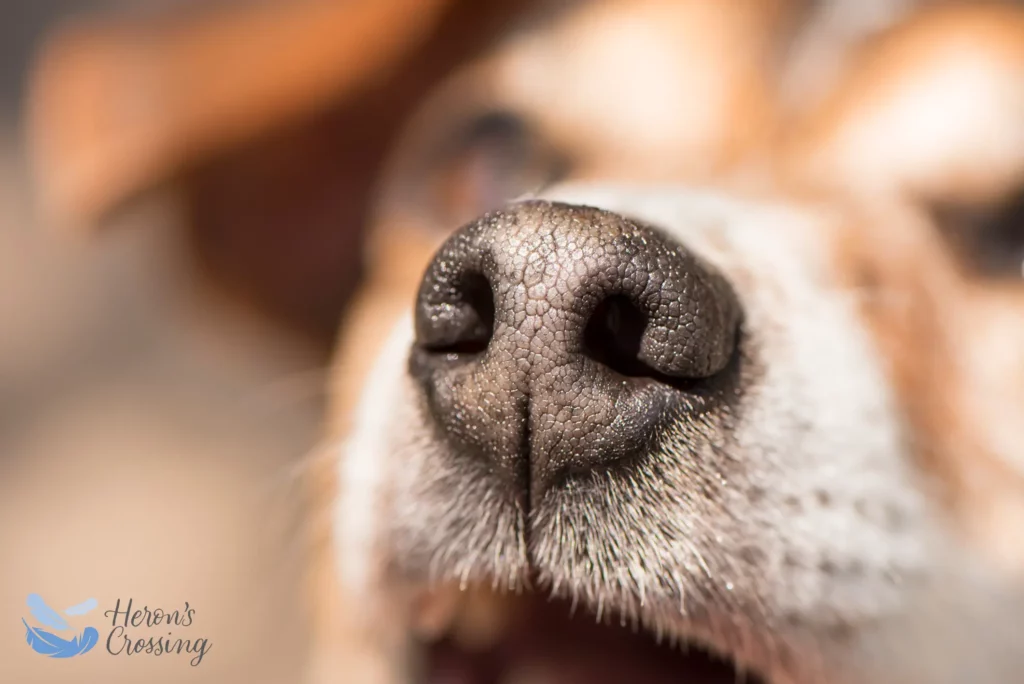If you think the smell of pizza is amazing, just ask your dog. His sense of smell is at least 40 times greater than yours. It’s astounding how dogs are able to smell things as much as 12 miles away if the wind blows right! While humans no longer need dogs to help them detect nearby wild predators, dogs can still help to be on the lookout for pizza delivery.
Not only does your dog have about 100 to 300 million sensors in his nose, but he also has small nasal tubes going to vomeronasal receptors in the roof of his mouth (just behind his incisors) that detect ‘undetectable’ pheromones and other things the nose isn’t programmed to catch, while his nose is busy catching molecules that create scents.
When your dog goes outside, he needs plenty of time to sniff the ground, the air, the trees, everything. It’s his daily news feed. Dogs can even move their nostrils independently of one another, to catch the direction of a whiff – another clue to help them learn more. By the time an approaching dog reaches him, your dog knows the other dog’s sex, age, diet and mood.
Smelling is his main way of relating to the world. While we are more visual in our processing of information, the olfactory processing area of your dog’s brain is about 40 times larger than humans. It is the sense he uses most.
This remarkable ability to sense pheromones, for example, helps a little puppy to identify its mother. Born with their eyes closed for about two weeks, puppies also have tiny heat sensors in their noses to help them find mama again if they wander.
Should a dog’s nose be wet or dry? Moisture helps to catch and enhance scent molecules better, so often you will see dogs licking their snouts as they hunt. You’ll also see them forcibly blowing air out of their nostrils through side slits. This causes a swirling air effect that stirs up leaves and dirt to catch even more information.
Researchers say that canines can detect a miniscule amount of something unusual in an Olympic sized pool of water! Dogs are so loving and eager to help people. They are extremely valuable and highly trainable assistants in military, police, rescue and medical professions in such difficult and dangerous ways as:
- Bomb detection
- Sniffing out cell phones, computers, hidden rooms and drugs
- Searching for suspects or dead victims. They can smell a body 15 feet underground.
- Helping archaeologists/paleontologists find ancient bodies & dino bones centuries later
- Searching disaster wreckage for trapped people & pets
- Medical diagnosis of cancer, diabetes, Parkinson’s, malaria, possibly coronavirus
- Medical assistance to warn of seizures or diabetic coma & get help
- Emotional therapy guardians. Adrenaline in sweat tells them a lot.
And all the soap and perfumes we wear? Not impressed. Dogs usually don’t like what we think smells delightful.
Not all dogs have the same sniffing superpowers. Dachshunds, for example, won’t be joining the K-9 Unit – they only have about 125 million olfactory receptors. German Shepherds have twice as many, and Bloodhounds are at the head of the pack with even more.
Dogs are currently being trained to recognize the odors of even more medical conditions than they already do. But rather than making dogs work all day in a doctor’s office, scientists are learning from them. Labs such as MIT, Aromyx, and various European scientists are building bio-electronic dog-type noses that use AI, machine learning and neural networks to catalog and interpret millions of odors. According to the NIH, “Electronic noses, or eNoses, provide an easy and inexpensive way to analyze gas samples. Thus, this device may be used for diagnosis, monitoring or phenotyping diseases according to specific breath prints (breath profile).”
Next time you go for a walk, it would be kinder to let your dog sniff his surroundings to his heart’s content rather than take him on a jog. It would make him a very happy companion.
Heron’s Crossing provides end-of-life care for pets in the Metro Atlanta area. In-home appointments with compassionate vets are available. If you’d prefer a home-like setting away from your home, our Decatur office is also available by appointment.

